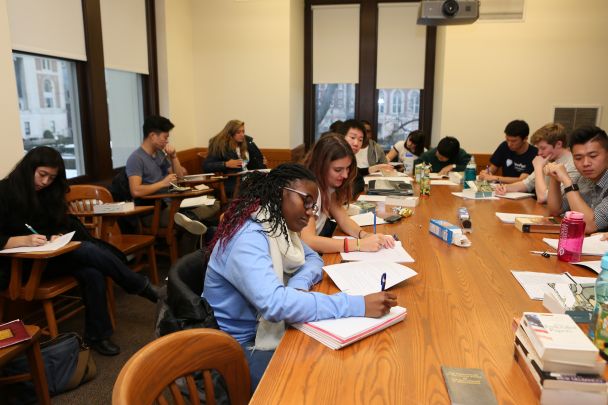At Columbia, we want you to succeed. This means making sure that you are taking classes appropriate to your academic background. During the week of the New Student Orientation Program (NSOP), you'll have the opportunity to take placement exams to determine which courses are the best fit for you. Read on to learn about the placement exams being offered, the option to request a section of University Writing tailored to non-native English speakers and tips from current Columbia students for taking care of yourself throughout the semester.
Placement Exam Information
Planning to take placement exams in chemistry, physics, math, music humanities or a foreign language? Be sure to check out the Fall 2018 placement exam information, which will continue to be updated between now and NSOP.
Levels of Calculus
All Columbia Engineering students must take calculus at the appropriate level. Please pay close attention to the way that Columbia teaches calculus. You can read about it in the Academic Planning Guide (p. 19). Additionally, you should plan to attend the Math Information Session during NSOP on Monday, August 27, 11:00 a.m.–12:30 p.m., 207 Math Building (2990 Broadway).
University Writing
You must take University Writing in your first year at Columbia. A few sections of University Writing are geared toward non-native speakers of English who wish to focus on issues of second-language acquisition and adjusting to a new academic culture. The deadline to express interest in the international section of University Writing is Wednesday, August 8.
Study Tips from Current Students
Watch this video for study and wellness tips from current students on the Columbia Undergraduate Student Life Facebook page!
And here are a few other things to keep in mind:
-
Tip #1: Rely on Your Adviser
Connect with your adviser in the Berick Center for Student Advising each semester as you’re choosing courses, as well as any time throughout the year that you have questions about academics, finding resources or support or if you’re not sure whom you should contact with a question or concern.
-
Tip #2: Talk to Your Professors
Make sure to read your class syllabi, which will contain information on assignments, deadlines and course policies. If anything is unclear, follow up by sending your professor an email or by attending office hours. Office hours are held during specific periods of time that professors set aside to speak with students. If you aren’t available during a professor's office hours, email him or her to see if you can meet another time. You should use office hours to ask questions about the syllabus, discuss course content (for example, if you are confused or would like to further examine something you have covered in class), or if you would like more information about the academic discipline in which your professor teaches. Your professors are your teachers, so address them as “Professor [Last Name]” unless they tell you otherwise and include salutations and closings in your emails.
-
Tip #3: Get Organized
Think ahead about how you will stay on top of academic deadlines. Will you use a planner or your phone’s calendar? Check out the University Registrar’s Academic Calendar for your school’s academic deadlines. Write down homework deadlines and exam schedules once you start classes and get your syllabi from the professors or teaching assistants (TAs).
-
Tip #4: Plan Ahead
Don’t leave assignments for the last minute. Have a question about citing sources or doing research? Ask your professor. Struggling with time management or feel that you need extra help? Make an appointment with your CSA adviser, who can connect you with resources.
-
Tip #5: Approach College As More Than Just Courses
Once you get to campus you will be making new friends, getting involved in clubs, activities and cocurricular opportunities, exploring a new city and living on your own. Make sure you allow space in your schedule so that you have time to enjoy and to grow.
Photo credit: Char Smullyan GS’98


